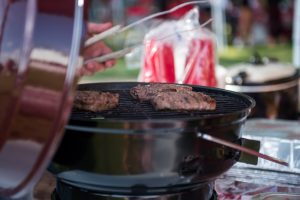When it comes to practicing safety on the Fourth of July, the first thing that usually comes to mind is staying safe around fireworks. And while that is important, it is just as vital to practice safety when preparing food so you don’t get sick and miss the epic fireworks show that evening.
 Denise DeSalvo, a registered dietitian and instructor in the department of human nutrition and hospitality management at The University of Alabama, teaches a course on food safety and sanitation, and has several tips to keep in mind when preparing your favorite July Fourth dishes.
Denise DeSalvo, a registered dietitian and instructor in the department of human nutrition and hospitality management at The University of Alabama, teaches a course on food safety and sanitation, and has several tips to keep in mind when preparing your favorite July Fourth dishes.
Keep your hands clean at all times
Although it’s pretty obvious to wash your hands before you start cooking, it is especially important when you handle raw meat.
“You’ll want to clean your hands when you go from handling raw meat to ready-to-eat food,” said DeSalvo. “If you’re outdoors and water and soap aren’t available, hand sanitizer and wet wipes are also good options.”
Keep raw food by itself
Keeping raw food by itself is critical. If cooking away from home, DeSalvo recommends using two coolers to make sure raw food is separated and doesn’t come in contact with ready-to-eat food.
Make sure grilled meats aren’t undercooked
While some may enjoy a steak or burger that is not well done, it is important to grill meats to the U.S. Food and Drug Administration’s recommended minimum temperatures. Steak and pork should be cooked to a minimum of 145 degrees Fahrenheit, while ground beef needs to be cooked to a minimum of 155 degrees Fahrenheit. Chicken calls for a minimum of 165 degrees Fahrenheit.
To ensure these meats are grilled to the recommended minimum temperature, DeSalvo suggests using a food thermometer to measure the temperature of the internal center of the piece of meat. Food thermometers are relatively inexpensive and can be purchased at grocery stores, cooking supply stores and online.
Make sure cold foods don’t get too warm
Foods such as coleslaw and potato salad are best when they are served at cooler temperatures. To prevent these types of dishes from getting too warm, DeSalvo recommends putting them in small containers and once one of the dishes either runs out or gets too warm, replace it with another small container of the dish.
Keep food covered
When the food line gets to the end, it’s important to go through and cover all of the food so those pesky insects don’t swarm before you have a second helping.
“Flies can easily spread foodborne illnesses like shigella, which can be hazardous,” said DeSalvo.
Don’t let food sit out too long
After the meal is over and other activities get underway, it’s easy to forget about food left in the hot sun. DeSalvo suggests putting leftovers in a refrigerator or cooler immediately after everyone has finished eating.
“I would throw away any food that has been sitting out for more than two hours,” said DeSalvo.
In addition to these tips, DeSalvo recommends bringing extra utensils, staying aware of the time and, most important, use common sense.
